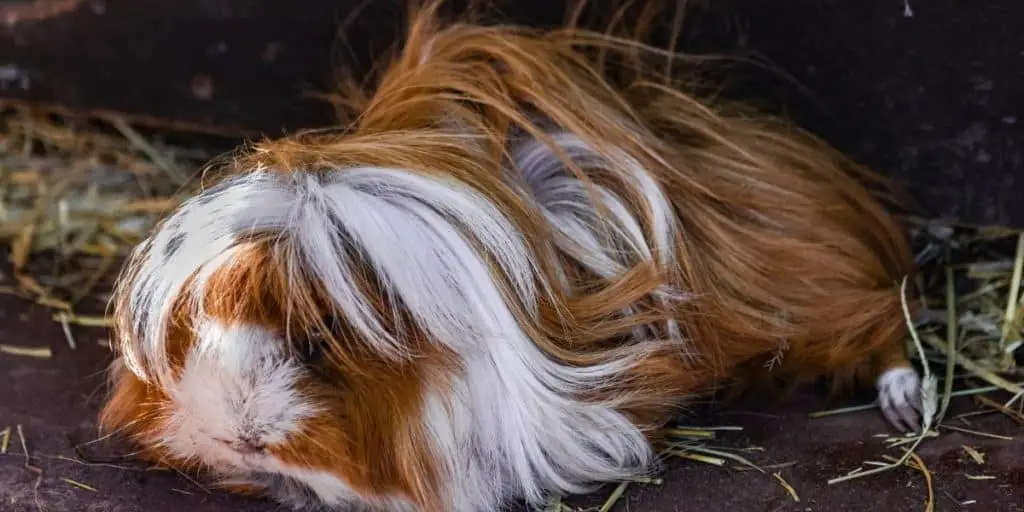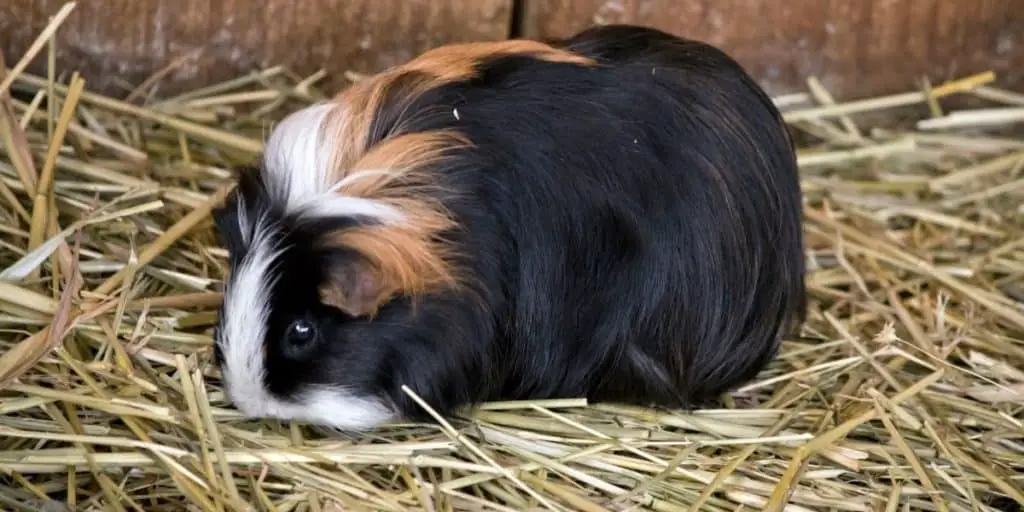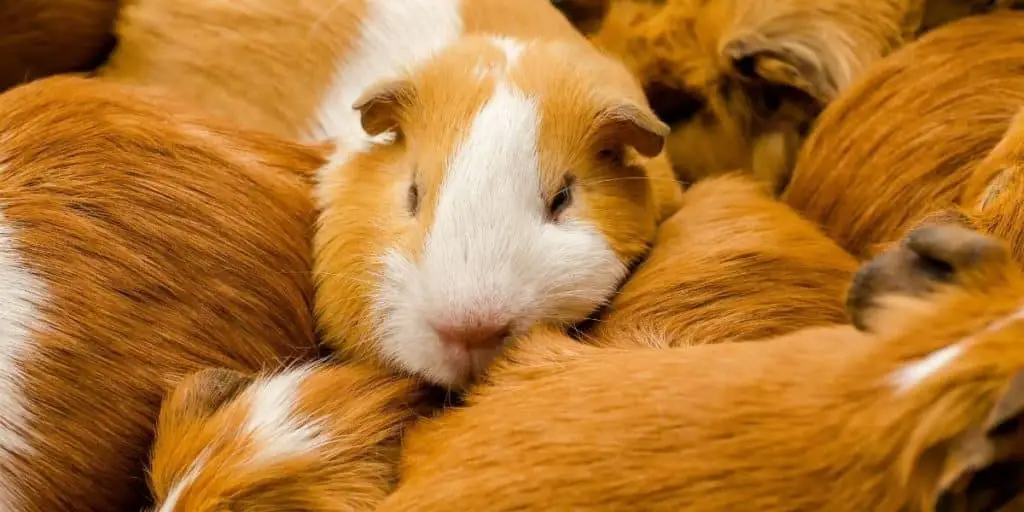
Do Guinea Pigs Hibernate?
The short answer is no. Unlike some animals that hibernate during the winter, guinea pigs don’t sleep for extended periods of time. In fact, they usually keep pretty active throughout the colder months. There are some things you can do to make sure your guinea pig stays warm and healthy through the colder months. Keep reading for tips on how to keep your guinea pig cozy this winter!
Animals will usually hibernate as a way to help them survive the cold. By hibernating, they slow down their metabolism and sleep to help their bodies to keep them warm.
So even though Guinea Pigs don’t hibernate, they do often reduce the amount of activity they do. This is during the winter months. They still eat, drink, play and move around but not as much as they do during the summer months.
If they get cold then their heart rate will slow and they save their energy, as this helps them stay warm. Getting too cold could cause your Guinea Pig to get Hypothermia.
That’s why it’s critical to provide your guinea pigs with a shelter and bedding so they can keep warm.
In this article, we’re going to go into what happens when guinea pigs get cold and also how to keep them warm and safe.
Hibernation Vs Torpor
The reason why many people ask “do guinea pigs hibernate” is because they go into a state of Torpor, which is very similar.
What is Hibernation?

Hibernation is a state of inactivity and reduced consciousness in animals, caused by cold weather or insufficient food. Hibernation occurs over the winter season, during which the animal’s metabolism slows or stops almost completely.
Depending on species, the typical hibernating animal enters into states that range from deep sleep to frozen immobility.
The body temperature lowers drastically (e.g., down to 3°C/37°F), slowing chemical activity so that bodily functions come to a near standstill.
What is Torpor?
Torpor is a state of reduced activity and consciousness in animals, similar to hibernation. It could be described better as a deep sleep.
Torpor usually occurs during times when the animal doesn’t have enough food or when the weather is too cold for them to stay active.
Unlike hibernation, torpor doesn’t usually last as long and the animal’s body temperature doesn’t usually drop as much. In guinea pigs, torpor can be caused by either extreme cold or lack of food.
If your guinea pig goes into a state of torpor, it’s important to get them warm and give them food as soon as possible.
By providing a warm shelter and enough food, you can help to prevent your guinea pig from going into a state of torpor.
Risks of Torpor in Guinea Pigs
The risks of torpor in guinea pigs
- Hypothermia
- Low blood pressure and sugar levels which can cause death
- Slowed breathing and heart rate which could lead to death if they go into a deep sleep
How Cold is Too Cold For Guinea Pigs?
Did you know that sudden drops in temperature outside could cause your Guinea Pig to get hypothermia. This is because they’re very sensitive to the cold.
Ideally your Guinea Pig should be temperatures of 65°F (18°C) and 75°F (24°C). This will help keep them healthy.
Anything lower than 60°F (16°C) is too cold.
It’s at this temperature that Guinea Pigs go into a state of Torpor, because they cannot keep warm. Remember Torpor is not hibernation, it’s a state of deep sleep.
You’ll know if they get into this stat as they’ll be very sluggish and wont be very active.
The biggest risk to this happening is they could get hypothermia, which happens when they’re too cold for a long period of time. If left, this could cause major health issues and even result in death.
NOTE: Since Guinea Pigs are normally very active animals. You should take them to a vet if they ever get sluggish and sleep more. Even if they’re warm.
How Do I Know If My Guinea Pig Is Too Cold?

Unless you have a thermometer it might be hard to know if they are too cold or not. Below are a coupe of things you can check;
- Touch your guinea pigs ears, nose or feet. If these feel cold when you touch them, then their body may be too cold
- If they are shivering
- Huddled together if you have more than one
- Sleep most of the day and night
- Not being as playful or very active
A really good way of checking is feeling the temperature yourself. If you’re cold then there is a very good chance that your guinea pig is as well.
If you do keep them outdoors normally, it might be worth bringing them inside.
What Do You Need To Know About Guinea Pig Winter Care?
If you live somewhere that doesn’t really suffer from cold winters (Im jealous!), then you don’t need to worry as much.
Although if like me and you live somewhere that does get cold during winter, your going to want to work out how to make sure your guinea pig is warm.
Its worth keeping an eye on the temperature even if they are housed indoors, as it can still drop below 60°F (16°C). If you do house them outside, then you want to pay even more attention and do things such as;
- Make sure their house is protected from the rain, wind and snow.
- Their shelter is warm and insulated
- Ensure their shelter is not on the ground – this will help keep it dry and warm.
- Provide extra bedding for them to keep warm – such as Hay.
I’ll go into more detail on this below…
Make sure your guinea Pig doesn’t get too hot…
Now when you trying to make sure your guinea pig is nice and warm, its important they don’t get too warm. Which is very easy to do in the winter.
Guinea Pigs getting too hot can actually be even more dangerous, since they’re bodies are not able to cool down.
You should always give your guinea pig a way to get away from the heat, if they are getting too hot.
Should You Keep Your Guinea Pig Outdoors?
If you can, id recommend moving your Guinea Pig indoors when its winter.
By keeping them outside in the cold you risk them getting hypothermia. (initially this might look like they are hibernating.)
Because of the space needed, its not always possible to find room indoors. If this is the case, try and put it in your shed or garage. This will protect them from the weather as well as add some extra heat.
If you still cannot place it in a shed or garage, you’re going to have to find other ways to keep your guinea pig warm in winter.
How To Keep Your Guinea Pig Warm in Winter

Hibernation isn’t something to worry about when it comes to guinea pigs.
Although if you live somewhere that gets cold during the winter, there are things you need to do in order to make sure your guinea pig is warm and healthy. Below are just a couple.
How To Keep Your Guinea Pig Warm Indoors
- Place the cage in a warm location, but not somewhere it could get too hot like a radiator.
- Add layers to offer additional heat
- Create areas of the cage with extra hay to snuggle in
- Provide exercise space as exercise can help to warm them up
How to Keep Your Guinea Pig Warm in an Outdoor Hutch?
- Ensure the hutch is insulated
- Keep the hutch off the ground as this can cause the hay to get damp and cool down the entire hutch.
- Make sure the hutch is dry
- Keep out of the rain, wind and snow
- Provide extra bedding but make sure to change it often
- Use a heat pad (make sure they have any area not covered by heat pad)
Check out the complete guide on how to keep your guinea pig warm here
What Are The Signs Of a Dying Guinea Pig?
It’s not nice to think but where you think your guinea pig is hibernating, it could actually be dying. How would you know?
- Not very active
- Not eating or drinking
- Diarrhoea or pain
- Breathing problems
Its really important to keep an extra eye on your guinea pig at winter. Remember Guinea Pis do not hibernate. It could be something more serious.
If you see any of the above, take them to your vet to be checked.
How Long Does It Take for Guinea Pigs To Die?
It can take anywhere from a few hours to a few days for a guinea pig to die. If you think your guinea pig is hibernating and it’s not getting better, then it’s best to take it to the vet to get checked out.
If they’re cold then hypothermia could be the cause of death.
The thing with Guinea Pigs is that they don’t always show when they’re not feeling very well. So it’s hard to catch any potential illness in time, before it gets serious.
They do this as when they are wild, they don’t want predators to know they are weaker as that will cause them to be targeted.
The key thing to remember is to keep note of any changes in their behaviour. If they’re;
- Sleeping more
- Sluggish
- Not very active
- Not eating as much
- Not making much noise
These are signs that something is not right and should be checked by a vet.
How To Increase Lifespan of Guinea Pig?
Animals in the wild will hibernate to help increase their lifespan, as its essential for getting through the winter months. Guinea Pigs do not have this luxury.
There are a variety of things you can do to help extend the life of your guinea pig. Some of these include:
- Providing a healthy diet and plenty of fresh water
- Making sure they have a comfortable and sheltered place to live
- Regular check-ups with a veterinarian
- Keeping them free from parasites and other health problems
- Providing plenty of stimulating activities and toys
Before you even get your Guinea Pig, you want to make sure that it comes from a good breeder. Making sure that its parents are healthy and don’t have any health concerns.
If your adopting an older Guinea Pig, make sure you know of any previous health issues.
As long as they have plenty of space, food, and a good environment your Guinea Pig should live for many years.
FAQs
Are Guinea Pigs Comfortable in Hot Weather?
No, they are not. Guinea pigs should not be left in direct sunlight and should have access to plenty of cool water and shade.
Guinea pigs should not get too hot as they can develop heatstroke, which can be fatal.
If the temperature is hot enough for you to uncomfortable or cause you to sweat, then it’s too hot for a guinea pig.
What Is a Normal Body Temperature for Guinea Pigs?
In order to keep your guinea pig healthy, the temperature should be between 65°F (18°C) and 75°F (24°C).
How to Prevent Heat Stroke in Guinea Pigs?
One of the main ways to prevent heat stroke in guinea pigs is by making sure they have access to plenty of cool water and shade.
You should also try to keep their environment as cool as possible, and avoid leaving them in direct sunlight. If the temperature is too hot for you, it’s too hot for a guinea pig.
Final Thoughts on If Guinea Pigs Hibernate
So do guinea pigs hibernate?
Guinea pigs do not hibernate, but if they get too cold they can go into a deep sleep.
If you have a guinea pig and live in a colder climate, be sure to provide them with plenty of warm shelter and keep an eye on their temperature to make sure they don’t get too cold.
Hypothermia is dangerous for guinea pigs and can cause health risks or even death, so be sure to take steps to keep your furry friend warm this winter!
As mentioned, it only takes a few extra steps to add some extra warm to your guinea pigs home. Extra bedding is one of the best and easiest ways and it gives them something nice to snuggle into.
The key is to just keep an eye out for them getting too cold. Such as them shivering or if you have multiple guinea pigs, you might find them cuddling together more.
Just remember if you see them sleeping more, less active or other symptoms that your concerned about then take them to the vet for a checkup.


